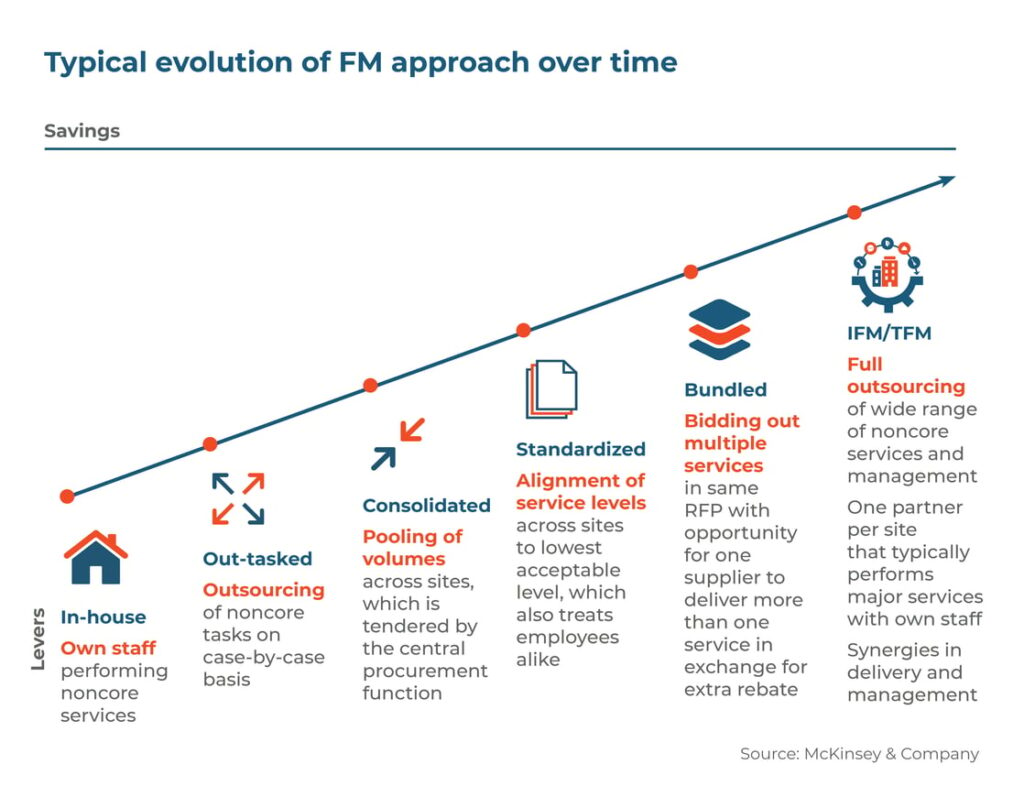Why Total Facility Management Is Necessary for Organization Success
Total Facility Management (TFM) offers as a keystone for business success by balancing varied operational elements such as maintenance, space use, and safety and security measures. As companies browse an affordable landscape, understanding the multifaceted benefits of TFM can be critical in driving cost efficiency and improving employee performance.
Comprehending Total Facility Management
Total Facility Management (TFM) includes a thorough strategy to handling an organization's buildings and connected services to ensure optimum performance, security, and efficiency. TFM integrates numerous disciplines, consisting of maintenance, operations, space management, and security protocols, to create a natural framework that sustains an organization's core objectives.
At its core, TFM intends to streamline the processes associated with facility management, minimizing redundancies and enhancing solution distribution. This approach involves the sychronisation of tasks connected to residential property management, such as repair services, cleaning, and power management, to foster an effective atmosphere for staff members and stakeholders alike. TFM also highlights the value of applying ideal practices and ingenious innovations to boost solution high quality and decrease operational costs.
By aligning facility management tasks with organizational objectives, TFM improves overall efficiency while making certain conformity with health and wellness, safety and security, and ecological guidelines. Thus, TFM serves not only as a logistical function but likewise as a critical property, adding to an organization's lasting sustainability and development.
Secret Benefits of TFM
Leveraging a comprehensive technique, companies that implement Total Facility Management (TFM) unlock a myriad of advantages that contribute to total company success. One of the key benefits of TFM is the enhancement of operational efficiency. By combining facility solutions under a unified management framework, companies can enhance procedures, reduce redundancies, and improve interaction throughout divisions.
In addition, TFM advertises an aggressive upkeep approach, which lessens downtime and expands the lifespan of facilitiess and devices (Total Facility Management). This positive approach not only enhances productivity yet likewise cultivates a much safer working atmosphere, ultimately resulting in higher staff member fulfillment and retention prices
Furthermore, TFM helps with far better source allocation by offering insights right into facility efficiency metrics. Organizations can determine locations for enhancement, permitting them to make informed choices that line up with their calculated objectives.
TFM and Cost Performance
Attaining expense effectiveness is a fundamental goal for companies, and Total Facility Management (TFM) plays a pivotal role in this undertaking - Total Facility Management. By incorporating various facility solutions under a solitary management structure, TFM makes it possible for companies to simplify procedures and decrease redundancies. This holistic approach causes considerable expense savings, as it eliminates the need for multiple suppliers and simplifies procurement procedures
Furthermore, TFM cultivates proactive upkeep techniques, which minimize the threat of costly repairs and downtime. By focusing on safety nets, organizations can expand the lifespan of their properties and reduce unanticipated expenditures. Furthermore, TFM includes energy management practices, which can significantly reduce energy costs with reliable resource use.
The centralization of information and analytics within TFM allows companies to make enlightened financial choices. By recognizing trends and great post to read areas for renovation, TFM enables tailored methods that better enhance expense management. The scalability of TFM services makes sure that as companies expand, their facility management techniques remain efficient and aligned with monetary goals.
Enhancing Worker Performance
A well-managed facility can dramatically boost employee productivity by creating a conducive workplace. Effective Total Facility Management (TFM) ensures that all aspects of the workplace-- from lighting and temperature level to cleanliness and safety and security-- are maximized. When staff members run in a room that is properly maintained and comfy, they are more probable to concentrate on their jobs, causing greater outcome and job fulfillment.
Moreover, TFM can improve partnership via the calculated layout of communal areas, encouraging synergy and development. By spending in the right sources and technology, companies can assist in smooth communication and streamline workflows, further boosting performance. Routine maintenance and punctual reactions to facility concerns stop disruptions that can or else hinder efficiency.
Furthermore, a healthy and safe workplace, sustained by TFM methods, reduces absence and promotes health, directly associating with enhanced performance levels. Inevitably, focusing on facility management is a financial investment not only in physical properties however additionally in the labor force itself. By promoting a setting that supports staff member requirements and choices, companies can grow a more involved and reliable workforce, driving total success and competitive advantage.

Future Trends in TFM
Welcoming technical advancements is set to reshape the landscape of Total Facility Management (TFM) in the coming years. As the demand for efficiency and sustainability increases, TFM will progressively embrace wise building innovations, incorporating Web of Points (IoT) gadgets to keep an eye on and take care of facility procedures in real-time. This shift will enable proactive maintenance, significantly decreasing operational costs and boosting service delivery.

Sustainability remains an important focus, with TFM experts anticipated to prioritize environment-friendly practices. This includes using renewable resource resources and maximizing waste management systems to decrease the carbon impact of facilitiess.
Remote management abilities will certainly additionally be increased, allowing facility managers to supervise operations from essentially anywhere. i thought about this This adaptability will certainly come to be vital as organizations adapt to hybrid work models. In summary, the future of TFM is poised for change with innovation, sustainability, and improved functional methods, making sure services continue to be affordable in a progressing landscape.
Verdict
By integrating numerous operational functions, TFM improves efficiency and straightens facility management with organizational purposes. As services increasingly take on ingenious modern technologies and sustainable practices, the value of TFM will continue to expand, guaranteeing lasting operational efficiency and competition in a developing industry.
